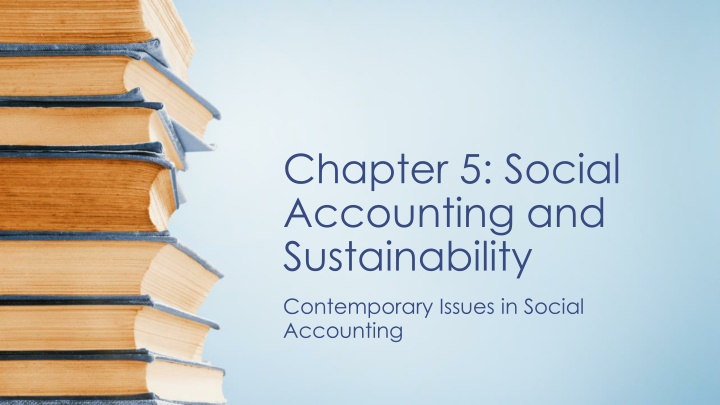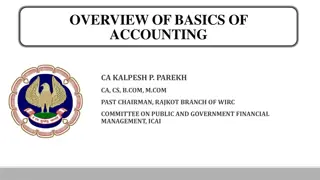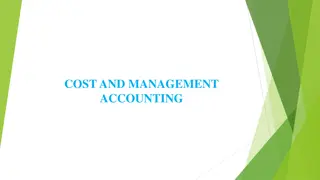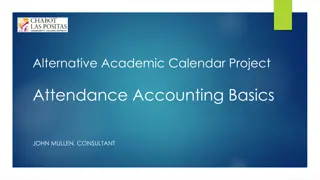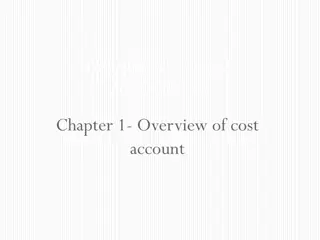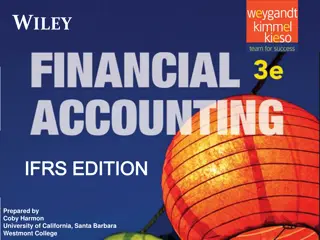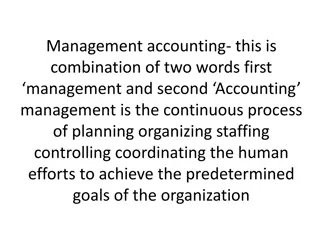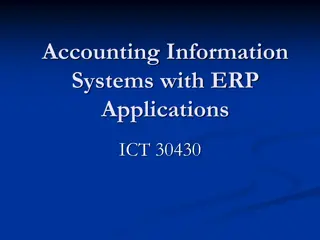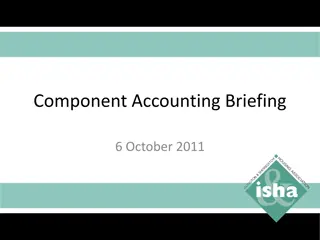Sustainability and Social Accounting in Contemporary Business
Social accounting and sustainability have become key concerns for organizations, governments, and regulators in today's business landscape. From the evolution of reporting guidelines to the Triple Bottom Line approach encompassing social, environmental, and economic factors, businesses are increasingly held accountable for more than just profit. John Elkington's framework emphasizes the importance of addressing the needs of people, planet, and profit to create a sustainable economy. By fulfilling social contracts, showcasing human rights policies, and addressing environmental concerns, organizations can attract capital, enhance community ties, and ensure economic stability while fostering a positive impact.
Download Presentation

Please find below an Image/Link to download the presentation.
The content on the website is provided AS IS for your information and personal use only. It may not be sold, licensed, or shared on other websites without obtaining consent from the author.If you encounter any issues during the download, it is possible that the publisher has removed the file from their server.
You are allowed to download the files provided on this website for personal or commercial use, subject to the condition that they are used lawfully. All files are the property of their respective owners.
The content on the website is provided AS IS for your information and personal use only. It may not be sold, licensed, or shared on other websites without obtaining consent from the author.
E N D
Presentation Transcript
Chapter 5: Social Accounting and Sustainability Contemporary Issues in Social Accounting
Chapter Structure Introduction The Triple Bottom Line Initiatives Sustainability Accountability
Introduction Social accounting has been a concern for accounting and corporations for over 40 years. The first organisations with such focus where created in the early 80s. Then guidelines and frameworks (TBL and GRI) were created. To this day, apart from these organisations, governments and other regulators are trying to enforce social reporting for corporations.
The Triple Bottom Line Modern organisations have concerns and are held accountable for more than just profit. Elkington predicted that organisations would need to report these concerns. He was confirmed as in 2015 92% of the world s 250 largest corporations reported under accounting frameworks. social and environmental
The Triple Bottom Line Created by John Elkington in 1997. People Internal shareholders, suppliers, etc.) External stakeholders (the community in the area, groups affected actions) Planet stakeholders (employees, Influenced most of the Social reporting to date. by organisational The environment affected by organisational actions. A general concern for environmental issues Profit A going concern for the organisation. Helping create a sustainable economy, in local and global level. Useful reads: Elkington, J. (1997). Cannibals with forks. (1st ed.) Oxford: Capstone.
The Triple Bottom Line (Social) Importance of the organisation fulfilling its social contract. Showing the human rights and social policy of the organisation attracts capital, both financial and intellectual. Connects the organisation with its local community.
The Triple Bottom Line (Environmental) A concern for more than emissions and water waste and pollution. Attracting employees. environmentally concerned customers and Environmental misconduct cost Volkswagen 18billion dollars in 2015.
The Triple Bottom Line (Economic) An economic stability (going concern) attracts more investors than an one-time stunning performance. Easier to make future plans under stable conditions. The betterment of the local economy means better economic performance for the organisation.
The Triple Bottom Line (Criticisms) The three aspects do not interact with each other. The TBL is different for every organisation, thus hindering comparability. Complex measurement and representation of the TBL allow for manipulation, greenwashing and creative reporting.
Initiatives The need for social and environmental development was answered by various organisations in the 80s and the 90s. Later these organisations created guidelines and frameworks in order for reporting and regulation of organisations to be feasible. Finally some governments joined environmental and social movement and created their national guidelines.
Indices Further initiatives for supporting sustainable development are the Dow Jones Sustainability Index (DJSI) in the U.S. and the FTSE4GOOD in the U.K. They were founded in 1999 and 2001 respectively and their mission is to help investors find environmentally and socially responsible companies to invest in.
National Guidelines (Japanese Ministry of Environment ) Formed its environmentally focused guidelines in 2000. It provided reporting guidelines and environmental KPIs. In 2012 changes were made so that the TBL would be included in the reports. Thus, an holistic approach of both social and environmental reporting for companies was undertaken. The guidelines are optional for all entities operating in Japanese grounds.
National Guidelines (United Kingdom) The UK has been regulating corporate social responsibility through the various Corporate Governance Acts over the years. The Corporate Governance Code of 2012 states clearly a social concern (employees and community). Since 2006 the organisations operating in UK ground must report specific environmental Key Performance Indicators (KPIs) Even though there is no single document with guidelines in the UK, the regulations in place force organisations to act responsibly. Compliance with the Corporate Governance Code is optional, but reasons for not complying must be reported, while environmental KPIs are mandatory.
National Guidelines (India) The National Voluntary Guidelines for Social, Environmental and Economic Responsibility of Business (NVG-SEE) are India s regulations in place for reporting. They became mandatory one year after their release in 2012. They are formed following the TBL and influenced by other guidelines, such as the ISO26000 and the GRI.
National Guidelines (Europe) Rather continental than national, the European Commission has mandated social and environmental reporting for large corporations with over 500 employees. Organisations operating in the EU must publish a stand-alone report and are encouraged to use any of the established guidelines.
Organisations The Development (UNCED) also called the Earth Summit, held in Rio De Janeiro, Brazil in 1992 inspired the creation of many organisations with the same focus. first United Nations Conference on Environmental The World Business Council for Sustainable Development (WBCSD) was formed from the CEOs from 200 international companies and is a coalition of companies, which work together under its flag to make a more sustainable world. The WBCSD has created its own framework for sustainable development, distant to the TBL.
Organisations (2) Ceres (formerly known as Coalition for Environmentally Responsible Economies) was formed on 1989 and later founded the Global Reporting Initiative (GRI). The GRI became an independent non-profit organisation in 2001. Ceres along with SustainAbility (founded by John Elkington himself in 1987) are both consultancy organisations that aim to provide companies with a sustainability plan and strategy. They both follow the TBL framework closely.
Organisations (3) The International Integrated Reporting Council (IIRC), was formed in 2009, by the Prince of Wales. Its mission is to promote integrated reporting and thinking in business under its international integrated reporting (IR) framework. On similar plan the Sustainability Accounting Standards Board (SASB) was founded in 2011 in U.S. However, the sustainability described in the standards created by SASB is mostly, focused on the economic impact of a company s actions.
Reporting Guidelines (GRI) The Global Reporting Initiative guidelines were issued in 2000. They were the first guidelines for integrated reporting. They were widely adopted and to this day they are the most used set of guidelines. 72% of all stand-alone reports issued are using the GRI. The GRI have a specific set of standards for SMEs as well, issued in 2014. Even though they are not as widely adopted. The mission of the GRI is to empower decision makers and help organisations create a vast stakeholder network.
Reporting Guidelines (ISO) ISO14001 were environmental standards initiated in 1996 and received a worldwide adoption almost immediately. The ISO26000, which are standards for integrated reporting came in 2010. Despite their high reputation and global recognition, the ISO26000 still lag behind in adoption, due to being issued very late.
Reporting Guidelines The GRI guidelines and the ISO26000 standards compose over 95% of all sustainability reports. Despite having differences, they are not competing, since they can both be used in a single report and evidently, this has better reporting results However, voluntary compliance makes reporting quality vary despite the standards used.
Sustainability (Definitions) Humanity has the ability to make development sustainable to ensure that it meets the needs of the present without compromising the ability of future generations to meet their own needs WCED (1987, p.16). Sustainability is the principle of ensuring that our actions today do not limit the range of economic, social, and environmental options open to the future generations. Elkington (1997, p. 20). These are the most used definitions of the term however the debate is heated.
Sustainability (Definitions)(2) Bebbington and Larrinaga (2014) argue that this definition is neither scientifically correct, nor radical, as it leaves matters of poverty, inequity and basic human needs ongoing. For Pirages (1994) sustainability means to provide equilibrium between societal demands from the environment and the capability of the environment to satisfy them. Kates et al. (2005) argue that it still remains unclear to everyone, what the details of sustainable development are.
Sustainability (Definitions)(3) White (1999), shows that the dispute on the definition of sustainability is reasonable as there are many ways one can perceive it. Van Marrewijk (2003) presents the argument that every company can perceive sustainability according to its own circumstances. However, organisations, as to who their important stakeholders are, and stakeholder groups are unsure, as to if the reports concern them or not. the various definitions make it unclear for
Sustainability Sustainable and Socially and Environmentally corporations are found to create a short term value loss for shareholder, but a long term profit. However, the initial cost to implement the strategies and the reporting techniques is high. Thus, due to this and the complexity of the measures, Small and Medium Entities (SMEs) still lag behind in adopting a strategy and reporting sustainability.
Public Sector Public sector sustainability reporting started becoming popular after 2010. Her Majesty s Treasury (HMT) in the UK published guidelines for sustainability reporting in the public sector in 2013. The GRI have issued specific guidelines for sustainability reporting in the Australian public sector in 2012.
Public Sector (2) The public sector sustainability reports are not widely adopted, as they are in the private sector. Stakeholder groups and the accountability factor of public sector organisations are different from their private sector counterparts. Growing focus in regulation by many governments.
Public Sector (3) Opportunistic representation is still available due to voluntary disclosures. Stakeholder pressure is forcing organisations to report more positive indicators and avoid risks. Stakeholder demand is also pressuring for more regulation for disclosure and transparency of organisations.
Sustainability reporting in the Public Sector Global Reporting Initiative Focal Point Australia (2012)
Accountability Organisations are held accountable for their actions by their stakeholders. Larger organisations affect a larger radius of people and thus are more inclined to legitimise their position, operations and actions. This explains, why most large corporations report their sustainable development and take actions towards a sustainable planet and society.
Accountability (Stakeholder groups) Each group has a different incentive for holding the organisation accountable for providing information on these demands. Shareholders want to increase their wealth, employees seek to either demand higher wage, governments monitor for tax purposes. Organisations are also held accountable by its people, to not abuse their labour and preserve their human rights, and to also give back to the local society, either financially, or with their actions.
Accountability (Environmental awareness) Most major governments have already set laws for emissions or waste production and drop, for maintaining a clear atmosphere, water and land use. Organisations in specific sectors regulate one another for environmental sustainability. Environmental activists and the media are holding companies accountable for their environmental performance.
Accountability (Actions) Organisations produce environmentally friendly products, but, also, act voluntarily for renewing resources, cleaning and protecting their local or global environment, depending on their influence. Providing funds for common-use establishments (e.g. parks, libraries, hospitals, etc.), funds, or volunteers for education, entertainment, or health. Furthermore, some well renowned, or historical organisations contribute to their local society by attracting visitors and tourists.
Transparency and Disclosure Social and Environmental reporting provide organisations with more tools to legitimise their position towards their stakeholders. In order to do that, they disclose their actual actions and results change their perception of what is legit and who their affected stakeholders are imply that the expectations of the stakeholders were too high to begin with
Summary The social and environmental concerns in the 60s and 70s resulted in the creation of consultant organisations and accounting standards in the 90s. Most of their frameworks were influenced by Elkington s Triple Bottom Line. Up to date the debate as to how sustainability is defined and if it is directly connected to the TBL is still ongoing. The sustainability reports are a fruitful way for organisations to communicate with all stakeholder groups and legitimise their actions
Useful Links Ceres: https://www.ceres.org/ European Commission Non-Financial Reporting: http://ec.europa.eu/finance/company-reporting/non-financial_reporting/ Global Reporting Initiative: https://www.globalreporting.org/ International Integrated Reporting Council: http://integratedreporting.org/ International Organisation for Standardisation: https://www.iso.org/ Sustainability Accounting Standards Board: https://www.sasb.org/ SustainAbility: http://sustainability.com/ World Business Council for Sustainable Development: http://www.wbcsd.org/
